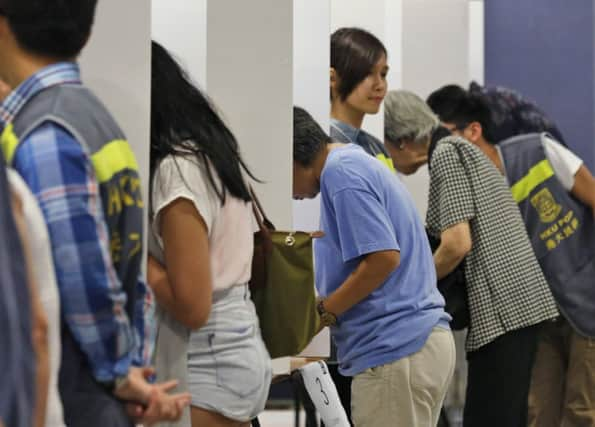Hong Kong votes on more freedom


Tensions have soared in Hong Kong over how much say residents can have in choosing their next leader, who is currently hand-picked by a 1,200-member committee of mostly pro-Beijing elites.
Beijing, which has pledged to allow Hong Kong residents to choose their own leader from 2017, has baulked at letting members of the public nominate their own candidates, saying they would have to be vetted by a Beijing-friendly committee.
Advertisement
Hide AdAdvertisement
Hide AdThe unofficial referendum comes a week after Beijing released a white paper in which it reasserted its authority over Hong Kong, a move that unnerved and enraged many in the city, raising fears of direct intervention.
At one polling station, about 20 people from pro-Beijing group Caring Hong Kong Power shouted at voters who braved the rain, urging them not to cast ballots. “You are sending your children to the battlefield,” one shouted at a voter.
Pro-democratic organisers of the Occupy Central with Love and Peace movement are offering voters three proposals on so-called public nomination. They have vowed to hold a mass protest if the former British colony’s government, which has carried out a consultation on electoral reform, does not come up with a proposal that meets their standards. The plan involves rallying at least 10,000 people to shut down the city’s central business district and has alarmed businesses in the Asian financial hub.
By 10pm yesterday evening local time, nearly 700,000 ballots had been cast since voting started on Friday, including about 440,000 through a smartphone app. About 200,000 more were cast online despite a massive cyberattack that left the site intermittently inaccessible and forced organisers to extend voting by a week until 29 June.
The outlook for Hong Kong’s democratic development “is quite pessimistic but we are also proactive and we will try our best to make miracles happen,” said Chan Chi-chung, a teacher voting at Hong Kong Polytechnic University. “If many people come out to voice their opinion, but the Beijing central government ignores that voice, then it’s over for Hong Kong.”
The central government’s liaison office has called the vote “a political farce that overtly challenges the Basic Law”, referring to the mini-constitution that promises a high degree of autonomy under the principle of “one country, two systems” for Hong Kong after it became a specially administered Chinese region in 1997.
Hong Kong’s current leader, chief executive Leung Chun-ying, has also said the three options do not comply with the law. Justice secretary Rimsky Yuen said there was “simply no legal basis” for the vote, which should be seen merely as “an expression of opinion by the general public”.
It has been a busy few weeks for pro and anti-establishment groups. Pro-Beijing group Silent Majority released a video last week warning of possible deaths and general mayhem if the Occupy Central protests proceed.
Advertisement
Hide AdAdvertisement
Hide AdAt a rally in support of the referendum on Friday, more than 100 people sang Do You Hear the People Sing? from the musical Les Miserables.
Pro-Beijing newspapers, Chinese officials and Hong Kong business tycoons have strongly criticised the Occupy Central campaign, saying it will harm Hong Kong. Activists say it is a peaceful movement demanding a “genuine choice” for Hong Kong voters.